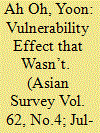| Srl | Item |
| 1 |
ID:
148117


|
|
|
|
|
| Summary/Abstract |
Using data from 16 countries and employing multilevel analysis that encompasses the national, regional, and individual levels, we find that both economic and social factors trigger anti-immigrant attitudes among Europeans. Regional per capita GDP is positively correlated with tolerant attitudes while the regional unemployment rate drives prejudice. We find a moderating relationship between immigrant population size and per capita GDP, which suggests that, as the size of the immigrant population increases, prejudice rises but only in poorer regions. In more affluent regions, an increase in the immigrant population corresponds to increased tolerance.
|
|
|
|
|
|
|
|
|
|
|
|
|
|
|
|
| 2 |
ID:
186409


|
|
|
|
|
| Summary/Abstract |
In response to the outbreak of a new viral infection in the early weeks of 2020, some countries imposed strict entry restrictions on visitors from China, while others opted for less stringent measures. Among the explanations for such variation, this study is focused on the argument that a country’s economic dependence on China, particularly via trade, affected its decision. This economic vulnerability argument posits that countries highly dependent on China for trade avoided imposing a ban because it might have caused (1) primary economic losses from trade disruptions and (2) secondary economic losses from Chinese sanctions. I empirically test this argument using an original data set on entry restrictions on China. The findings do not support such a hypothesis. Using the nonconforming cases of Japan and South Korea, I speculate that country-specific factors, which tend to be idiosyncratic and political, may have played a role.
|
|
|
|
|
|
|
|
|
|
|
|
|
|
|
|